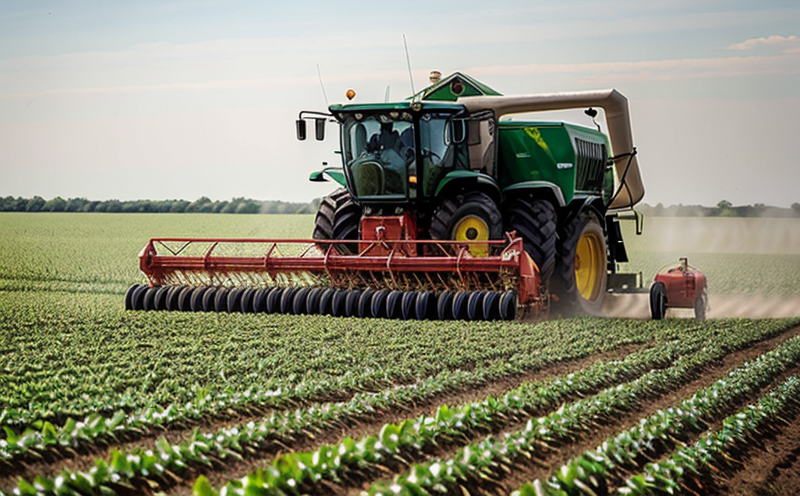Harvest Moisture Content Testing
The testing of harvest moisture content is a critical step in ensuring crop quality and optimizing post-harvest processing. In agriculture and forestry, the moisture content of harvested crops directly impacts storage life, transportation logistics, and final product quality. High moisture levels can lead to spoilage, mold growth, and increased risk of contamination, while low moisture levels may result in reduced yields and economic losses.
Our Eurolab team specializes in providing accurate and reliable harvest moisture content testing services tailored to the unique needs of agricultural and forestry sectors. We use state-of-the-art equipment and follow international standards such as ISO 13095-2:2016 for grain, seeds, oilseeds, and legumes; ASTM E96:2021 for wood products; and EN 14768:2012 for biomass. Our approach ensures that you receive precise measurements which are essential for decision-making processes.
For grains like wheat or corn, the acceptable moisture content ranges from around 13% to 15%, depending on storage conditions. Exceeding these limits can cause rapid deterioration during transit and storage. For example, if rice is harvested at higher than recommended moisture levels (typically around 14%), it could lose its quality within days due to fungal growth or insect infestation.
Understanding how different factors influence the optimal harvest time is crucial for maximizing crop yield and minimizing post-harvest losses. Factors such as weather conditions, soil type, and variety of crops play significant roles in determining the best moment to start harvesting operations. Our experts help clients assess these variables accurately by leveraging advanced meteorological data and historical trends from various regions.
When preparing samples for moisture content testing, it is important to ensure they represent a fair cross-section of the entire crop batch. This involves taking multiple subsamples at regular intervals across fields or warehouses before combining them into one composite sample. Proper sample preparation ensures that subsequent analyses yield representative results reflecting true field conditions.
Our laboratory uses precision instruments like near-infrared spectrometers (NIRS), microwave ovens, and drying ovens calibrated against certified reference materials to achieve accurate measurements within ±0.5% accuracy for most samples. These methods comply with relevant international standards including ISO 13095-2:2016 and ASTM E96:2021 mentioned earlier.
The importance of proper moisture content testing extends beyond just storage considerations; it also plays a vital role in ensuring food safety regulations are met. Excessive levels of moisture in certain types of produce can foster pathogen growth, posing potential health risks if not addressed promptly through appropriate drying or other treatment processes.
- Grains: Typically aim for 13-15% moisture content post-harvest
- Fruits & Vegetables: Generally around 7-9%, but varies by type
- Biomass: Targeted at approximately 20-25% depending on intended use (fuel or feed)
By partnering with Eurolab for your harvest moisture content testing needs, you gain access to a team of experienced professionals equipped with the latest technology and methodologies. Our services not only provide accurate data but also offer valuable insights into optimizing harvest schedules and enhancing overall crop productivity.
Why It Matters
Ensuring proper moisture content at harvest is essential for maintaining high-quality products throughout the supply chain. By accurately measuring and managing this parameter, stakeholders can prevent spoilage, reduce waste, enhance shelf life, and maintain consumer satisfaction.
In agricultural settings, improper handling of harvested crops due to incorrect moisture levels often leads to substantial financial losses. For instance, in the case of wheat or corn, every percentage point increase above 14% can result in significant reductions in market value. Additionally, high-moisture content grains are more susceptible to insect damage and fungal infections, further degrading their commercial appeal.
From a broader perspective, accurate moisture content testing contributes significantly towards sustainable farming practices by promoting efficient resource utilization and reducing environmental impact associated with improper storage or processing methods. It also supports compliance with international food safety standards such as Codex Alimentarius which mandates strict limits on moisture levels in various food items based on their classification.
For forestry applications, particularly when dealing with wood products like lumber or sawdust used for biofuel production, maintaining appropriate moisture content ensures optimal performance during processing stages. Excessive humidity can lead to dimensional instability while insufficient hydration may result in poor combustion efficiency affecting both quality and profitability metrics.
Eurolab Advantages
At Eurolab, we pride ourselves on offering unparalleled expertise and comprehensive support for all aspects related to harvest moisture content testing. Our commitment lies not only in delivering precise analytical results but also in providing actionable recommendations based on those findings.
- State-of-the-Art Equipment: Utilizing cutting-edge technology including near-infrared spectrometers, microwave ovens, and drying ovens calibrated against certified reference materials.
- Compliance with International Standards: Adhering strictly to recognized guidelines like ISO 13095-2:2016 for grains, seeds, oilseeds, and legumes; ASTM E96:2021 for wood products; and EN 14768:2012 for biomass.
- Experienced Specialists: Skilled personnel dedicated to understanding the nuances of each crop type and its specific moisture requirements.
- Customized Solutions: Tailoring our services to meet individual client needs whether it involves large-scale operations or smaller farm enterprises.
We understand that every business has unique challenges when it comes to managing harvested crops effectively. That’s why we offer flexible service packages designed specifically for your organization’s requirements. Whether you need routine testing throughout the growing season or one-off assessments at key points during processing, Eurolab can accommodate these requests seamlessly.
Use Cases and Application Examples
- Grain Mills: Ensuring consistent quality in milled products by monitoring moisture content during the drying process.
- Fruit Packers: Maintaining optimal conditions for fresh fruit dispatch to minimize post-harvest decay rates.
- Feed Manufacturers: Adjusting production parameters based on raw material specifications to meet industry standards.
- Biofuel Plants: Optimizing biomass drying procedures to achieve desired energy outputs from processed materials.
In addition to these examples, our team frequently works closely with research institutions and government bodies in conducting extensive field trials aimed at improving agricultural practices globally. These collaborative efforts contribute valuable data points which help refine current methodologies used within the industry.





